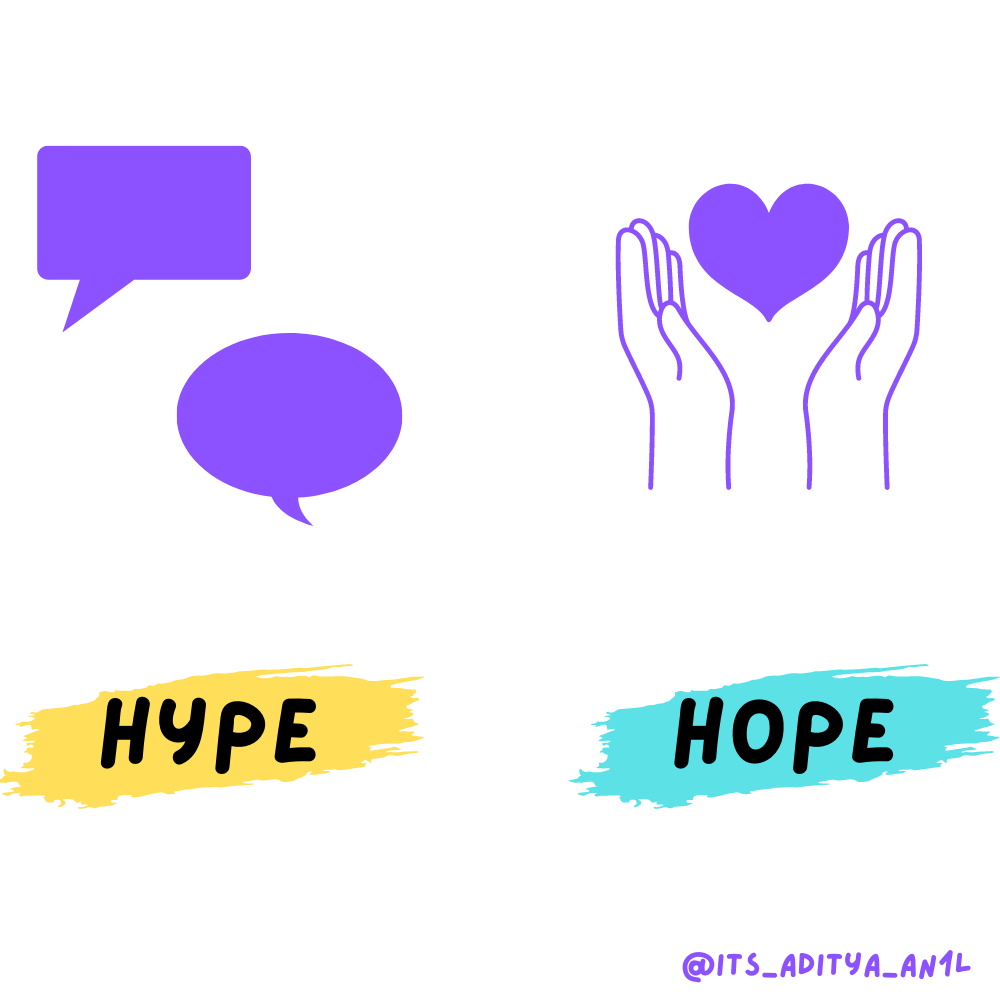Hype and Hope: The Hidden Factor of A.I. surge
How Hype and Hope influence both rapid A.I. development and heavy competition in AI landscapes
The whole booming saga in generative AI began when OpenAI released ChatGPT; the hype it created in the public was massive. The majority of the public had never seen such a tool where they can see and interact directly with an AI, the way they interacted with humans. While personal assistants were there, like Siri and Alexa, they didn't garner as much attention as ChatGPT. But why? Firstly, ChatGPT is undoubtedly more powerful that any previous chatbot. But then secondly, there were other two factors that made chatGPT stand out: accessibility and interactivity.
You and I, who have tried ChatGPT before, know very well how easy it is to get started with the chatBot. Once you have your hand on it, it does remarkable things that not only seem to save your time but also do it in a way that sounds smart.
Then we saw many apps based around NLP come up, pertaining to the hype that the public created - both by the experts and the normal users. This surge was not only seen in small startups, but also in big corporates - starting with Microsoft. Microsoft introduced its new AI-powered Bing with its partnership with OpenAI; and as predicted, it gave Google a heavy blow. Google started panicking - creating its own AI chatbot Bard - which turned out rather disappointing at the start. Bing now seems to get its foot back in the Search Market - which is still dominated by the mighty Google.

In midst of all the hype and chaos, other corporates also came in and tried harnessing the AI - these included other search engines (like Opera), social media sites like Facebook which is creating a new LLM model for researchers, and Reddit is straight up charging AI companies for using its API and data. More recently Amazon too entered the generative AI game by selling its new AI tools for cloud developers.
Big companies are getting profited by AI directly or indirectly. While some harnessed AI to create their own product, others used AI features in their existing product (like a premium extension) and tried to monetised it. However, almost all big corporations use AI to make their workflow easier by reducing workload and time doing tedious tasks.
But why suddenly, in less than 3-4 months, there is such a huge surge in AI-powered apps? Is the reason obvious - that standard ‘better AI - more powerful and smarter’ argument that everyone gives (especially by the AI experts)?
From what I have noticed, the ‘smarter and more intelligent AI machine ever’ is indeed a reason behind the success of many AI-powered apps. But if that was the case, why didn't we see such a similar surge five or ten months back, or one year for that matter, when GPT was launched around 2018?
The primary reason is the increased demand for AI-powered app by the public; and the two things it is fueling this demand: Hope and Hype
The Hidden Factor ‘H’: Hype and Hope
We have covered about AI search engine race in this newsletter way back, even before Bing AI was launched. After ChatGPT made headlines and OpenAI acquired a partnership with Microsoft, every other tech money is making its own AI-powered apps and products.
And OpenAI releasing APIs also had a huge impact in this surge.
Whether it is Khan Academy using AI chatbot Khanmigo for helping students and instructors, Duolingo using AI for Duolingo Max for helping users learn languages, or Stripe using for AI to make digital payments safer for the users- all seem to exploit the new AI (more specifically the generative AI) technology. If you note, all these companies use the latest language model - GPT4 to implement AI in their own products.
We see that when the company has implemented an XYZ product with AI, the excitement and hopes around the product subsequently increase - for both the developers and consumers (although the hype only lasts initially of course, and then ceases).
Undoubtedly, this leads to an increase in profits and revenue. For instance, Worldwide artificial intelligence (AI) software revenue is forecast to total $62.5 billion in 2022, an increase of 21.3% from 2021, according to a new forecast from Gartner, Inc.
But is this due to the fact that AI made the whole product better in some sense? Not really.
Hype has some role to play in them as well. As long as companies can sustain the hype, the better it usually performs. We all knew what happened to Baidu’s chatgpt-rival Ernie Bot. Everyone, including investors of the company, was thrilled to see that Baidu is competing in the global generative AI race. Mixed reactions, anticipations and of course - hype, played a huge role in this. But what happened, in the end, was fell short of expectations, leading Baidu to a 10 per cent drop in share.
In the current times, nearly every tech company is transitioning into AI. Their role is crucial in further AI developments.
But why only limit to Tech companies? After all, corporations from other sectors - finance, law, and the entertainment and art industry have found ways to harness AI, right?
Tech Companies and A.I. Demand, Hype, Revenue
Short answer, Tech companies have exploited AI so much that if we want to control AI surge in future, controlling the activities and advancement around AI for these Tech Companies would be crucial for us.
They are the primary drivers of HYPE and HOPE in the whole AI landscape.
Tech companies do either of the three major tasks with respect to this - create a new AI-powered app, create a new AI model, or both. Microsoft, the earlier adopter of A.I. Search engine, didn't just embed AI capabilities in a normal search engine - but also implemented and innovated new elements that further fine-tuned the GPT model. Google, the same corporation that made transformer models first time and provided them to the public, had a larger role in creating and innovating AI tools.
You see, Tech companies are the entities that harness these AI-powered apps for their business model AND also drive the advancements in AI developments. These companies in a way create their own demand, generate hype and expectation, and keep making advancements in AI; which in turn generate more hype and drive competition - ultimately leading to high profit.
Hype in this sense brings both revenue and development by creating demand and competition. And along with it, the Hope of the public also serves as a driver of expectations with these companies.
This self-sustaining loop of hype, demand and advancement is key to further AI developments.
Heavy competition just makes it worse as then the companies will keep on making new AI products without applying the necessary AI safeguards.
Thus, in theory, the universal pause for AI development for 6 months seems superficially good, but it's pretty useless if nothing is done in terms of safeguards and regulations - possibly making these AI apps somewhat safe (if not fully).
GPT-4 - presumably the strongest A.I. NLP model out there - still has instances where it hallucinates and makes up facts. To correct the faults and biases it holds, it would take time (a lot of time). If we keep on going to make newer and more advanced models, we will fall way behind in actually bringing corrections to these models.
The rise in development won't go hand in hand with the rise in efforts to tackle the misinformation that these models produce. The hype will just make this a whole lot worse. Everyone creates hype on the new advancements in AI, but rarely very few address the practical risk and implications of these models. Why can't we create hype for that?
OpenAI seems committed to fine-tuning GPT4 and making it more safer before they move on to create the next iterations of GPT models - the successors of GPT 4.
I sure place my belief in them and other AI companies out there. AI is undoubtedly the future - and it is here to stay. Let’s make the most out of it, in a responsible and safe manner.








